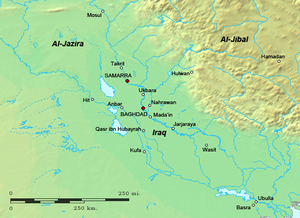Izz al-Dawla
| Izz al-Dawla | |
|---|---|
Adud al-Dawla | |
| Born | 943 Ahvaz, Iran |
| Died | 978 Iraq |
| Spouse | Daughter of Lashkarwarz |
| Issue |
|
| House | Buyid |
| Father | Mu'izz al-Dawla |
| Religion | Shia Islam |
Bakhtiyar (
Early life

Izz al-Dawla was born as Bakhtiyar, and was the son of
In the spring of 955, Mu'izz al-Dawla became very ill and decided to name his son as his successor. Five years later, the caliph officially recognized this by granting Bakhtiyar the

Reign

In 970, Izz al-Dawla, in order to end the hostilities between the Dailamites and Turks in his army, began to make several marriages with high ranking Turks to strengthen the Dailamite-Turkic relationship; his son Marzuban ibn Bakhtiyar married a daughter of Bukhtakin Azadruwayh, and his other son Salar married a daughter of Baktijur.[2]
Izz al-Dawla continued his father's policy of fighting the Shahinids who ruled the Iraqi marshlands, but he was unable to overcome them. At the same time, he ignored the border with the
Izz al-Dawla also had financial problems; in 973 he invaded the Amirate of Mosul, against the advice his father had left him. The campaign was a disaster; the
At this point, Rukn al-Dawla ordered 'Adud al-Dawla to march on Wasit and relieve Izz al-Dawla. The choice of 'Adud al-Dawla was somewhat curious: he had earlier advocated the removal of Izz al-Dawla due to the latter's perceived incompetence, and had granted asylum to a brother of the Iraqi amir that had launched a failed rebellion in Basra. Despite this, 'Adud al-Dawla complied with the order, although he traveled as slowly as possible in order to give Sebük-Tegin the chance to overpower Wasit.
Izz al-Dawla, however, managed to hold out, and Sebük-Tegin died during the siege.[5] 'Adud al-Dawla therefore eventually decided to restore him in Baghdad. Shortly afterwards however, a revolt launched by Izz al-Dawla's Dailamite mercenaries gave 'Adud al-Dawla the opportunity to overthrow his cousin. Having done so, he would have ruled Iraq directly, but Rukn al-Dawla vehemently opposed this. Izz al-Dawla was therefore made 'Adud al-Dawla's viceroy to Iraq. The latter's departure for Shiraz prompted Izz al-Dawla to immediately revoke his subservience.
Civil war and death
Rukn al-Dawla died in 976, throwing the Buyid empire into chaos. Izz al-Dawla refused to recognize 'Adud al-Dawla's succession to the position of senior amir. He took new titles for himself, and married one of the caliph's daughters, signifying the caliph's assent to his policy. 'Adud al-Dawla then prepared to invade Iraq. Despite having prepared his army and his allies, Izz al-Dawla was defeated in
References
- ^ "Morton & Eden, Auction 99". biddr.com.
- ^ Amedroz & Margoliouth 1921, p. 302.
- ^ Bosworth (1975), p. 265
- ^ Bosworth (1975), p. 266
- ^ Bosworth (1975), p. 267
- ^ Kennedy (2004), pp. 272, 230
Sources
- Amedroz, Henry F.; Margoliouth, David S., eds. (1921). The Eclipse of the 'Abbasid Caliphate. Original Chronicles of the Fourth Islamic Century, Vol. V: The concluding portion of The Experiences of Nations by Miskawaihi, Vol. II: Reigns of Muttaqi, Mustakfi, Muzi and Ta'i. Oxford: Basil Blackwell.
- ISBN 0-521-20093-8.
- Donohue, John J. (2003). The Buwayhid Dynasty in Iraq 334 H./945 to 403 H./1012: Shaping Institutions for the Future. Leiden and Boston: Brill. ISBN 90-04-12860-3.
- ISBN 978-0-582-40525-7.
- Nagel, Tilman (1990). "BUYIDS". BUYIDS – Encyclopaedia Iranica. Encyclopaedia Iranica, Vol. IV, Fasc. 6. London: Routledge & Kegan Paul. pp. 578–586.
External links
- Hachmeier, Klaus (2018). "ʿIzz al- Dawla". In Fleet, Kate; ISSN 1873-9830.
